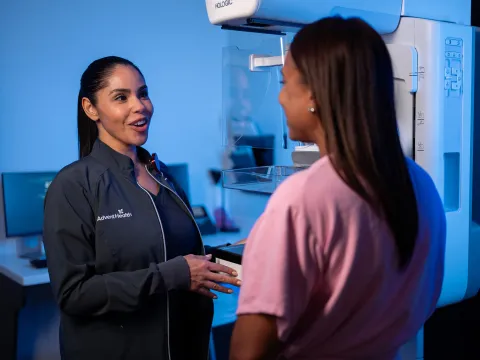- AdventHealth

A recent study done by doctors at NYU Langone Health center has linked obesity to New York City coronavirus hospitalizations. Aside from age, obesity was found to be the biggest risk factor in hospital stays. To learn more about obesity and coronavirus, we spoke to AdventHealth bariatric surgeon, Michel Murr, MD, who urges those living with obesity to take action and regain control of their health to help prevent illnesses like COVID-19.
Obesity Linked to Coronavirus
“Right now, there’s so much new information and data. but we know from initial COVID-19 reports that many people with the virus who died have been obese,” explains Dr. Murr.
Why this is, Dr. Murr says, is still being studied, but we know obesity is very common and one in five people with obesity have the metabolic syndrome. Metabolic syndrome is a cluster of risk factors that increase the chances of developing diabetes, heart disease and stroke.
“People with obesity and diabetes struggle to control their blood sugar. With high blood sugar, the body becomes more susceptible to infections of any kind, including coronavirus, and it also weakens the immune system,” said Dr. Murr, adding, “This also causes a delayed healing process.”
Another issue can be lung function, Dr. Murr explains. “People with obesity also have reduced lung function, so when there’s a disease like coronavirus that usually attacks the lungs, that makes for a very stressful situation on the body.”
Healthy Diet and Physical Exercise
For many of Dr. Murr’s patients who are currently living with obesity or who have recently lost weight, they are very concerned about gaining weight during quarantine. With social distancing as important as ever for those who are at higher risk of contracting coronavirus or developing more severe cases, his patients are finding it hard to make healthy choices while being limited in where they can go and what they can do.
Gyms are closed, most public facilities are closed, and there’s a greater urge to snack without having much else to stay busy. “It’s so important to keep making the right choices, even during quarantine,” Dr. Murr said. “A lot of my patients have made so much progress, and they need to adjust their old routines to instead now be doing online exercise programs or plan ahead for their healthy meals.” A healthy diet and exercise are crucial to regaining control of weight and lifestyle.
Steps to Managing Obesity
When Dr. Murr begins seeing a patient who is ready to work towards weight loss, he first looks to make sure they are able to commit to a healthier lifestyle.
When we’re trying to lose weight, the body adjusts to higher body weight easier than lower body weight. So, diets don’t always help those struggling with obesity. Dr. Murr’s team addresses diet and weight loss and works with their patients to change their lifestyle, but further action is often needed.
Medications, diet and exercise are all limited in what they can achieve for the severely obese population, Dr. Murr explained. And for that group, he recommends bariatric surgery, also known as weight-loss surgery, as the next option.
Bariatric Surgery
“The more important benefits of bariatric surgery are the improvement of general health and quality of life,” said Dr. Murr. “Specifically, diabetes, hypertension, sleep apnea hyperlipidemia, heartburn, degenerative joint disease, fatty liver and many other conditions improved dramatically after weight loss to the point of not requiring any medications.”
The most common bariatric operations are gastric bypass, gastric sleeve (or sleeve gastrectomy) and duodenal switch. These procedures can be performed laparoscopically or robotically through small incisions, reducing pain and minimizing recovery time after surgery.
With gastric bypass surgery, a small pouch is created from the top portion of the stomach, which is then connected directly to the small intestine. Ingested food that goes into the esophagus and the pouch and then goes into the small intestine and bypasses the stomach. This operation not only reduces the amount of food that can be ingested but it also has a profound impact on how the body metabolizes foods and carbohydrates.
A gastric sleeve procedure is the simplest, and this is where the stomach is divided into two compartments and the larger compartment is removed. The stomach pouch that remains is the shape and size of a small banana and is no longer capable of storing large portions of food. The effects of gastric sleeve on metabolism are less obvious than in gastric bypass.
Duodenal switch is the most complex of the three options, but also the most effective weight-loss surgery. Duodenal switch is a procedure that promotes weight loss by limiting the amount of food that can be consumed. First, a gastric sleeve operation is performed, and then the second part of the procedure reroutes food away from the upper part of the small intestine. How you break down food will also be altered to cut back on how many calories are absorbed.
Who Can Get Weight-Loss Surgery?
Candidates for bariatric surgery need to have a body mass index (BMI) of over 40 kg/m2 (about 100 pounds overweight), or it can be as low as 35 if you also have a condition that’s associated with obesity, like hypertension, diabetes or sleep apnea. There is not a strict age maximum for surgery candidates, but Dr. Murr says they consider young adults as young as age 16, provided a high level of maturity.
What’s the Recovery Time for Bariatric Surgery?
“We have perfected doing these operations with minimally invasive techniques (laparoscopic or robotic) which reduces post-surgery pain and the hospital stay. In general, most patients leave the hospital one day after gastric sleeve and one and a half days after gastric bypass,” said Dr. Murr.
It takes seven to 10 days to go back to a full schedule of daily activities at home and patients are released back to full time work within four weeks after surgery. “This is an important recovery time, as patients use it to adjust to the new eating habits and focus on their wellbeing,” Dr. Murr explains.
Take Action to Regain Control of Your Health
When it comes to your health, it’s empowering to know you have the option to take control. Change can be a good thing if it means a step towards your healthiest and happiest self, and if you’re living with obesity, it may be time to consider bariatric surgery as an option towards getting there. To learn more about your options for weight loss, click here.




